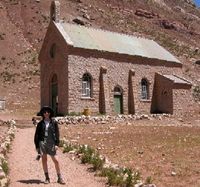Preparing to Go Locavore
The day is quickly approaching when Enrico and I will start our one-month experiment with (almost) pure locavorism. Locavore is the term coined for people who emphasize eating local. It was the Word of the Year last year for the Oxford American Dictionary (following the related "carbon neutral" in 2006), and the concept was further popularized this year by the publication of Barbara Kingsolver's Animal, Vegetable, Miracle. Locavorism is becoming increasingly popular, even mainstream. Why? Well, a variety of reasons:
All of these things are concerns for me too, and so we've been preparing to make July Locavore Month.
Because I needed to do some research into where we would find various food items, in fact we are well on our way to locavorism already. I've been hitting the farmer's market every week, just like last summer, and oh! the beautiful, tasty produce. One big revelation is meat. Though we have been largely vegetarian for years, that was not about a moral objection to flesh-eating, but rather about all the things noted above, the unsustainability and unseemliness of meat production in this country. But buying some beef from a happy, field-raised cow or chicken grown by a friendly farmer nearby feels different, and possibly a better ethical choice than tofu made from industrially produced soybeans.
So I finally stopped in the local meat market in our neighborhood, Bob's Quality Meats - and why have I never done this before? The proprietor is a third-generation butcher, getting his meat from ranchers in Eastern Washington who supplied his father (the eponymous Bob) and grandfather before him. None of the meat comes from feed lots, and most of it is organically fed (though he was quick to explain that "organic" can only apply to the grain that's fed to the animals, since you can't control the grass; plus, chickens are omnivores). I bought chicken! and bacon - oh my god, real bacon. It's a revelation, really. Next time I'm going to try some of their sausages, made on-site.
So what's a locavore to eat? Happily, we live in a place that provides a lot. We've chosen Washington state as our foodshed for this exercise (as opposed to the more restrictive 100-Mile Diet).
Part of what I'm coming to appreciate too is that we've not only lost touch with where our food comes from and how it's grown, but also basic cooking and preserving skills that were a matter of survival and good eating for milennia. I can't tell you how many times I've arrived home from the farmer's market with something and thought, huh. I wonder how you cook that? So I'm thinking I might follow up Locavore July with a focus on preparing and preserving food in August - making cheese and yougurt, juicing, canning, drying, etc.
For those interested in playing along - join us this summer!

No comments:
Post a Comment